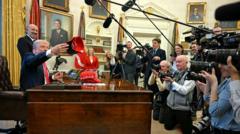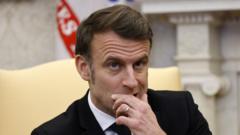The Trump administration has implemented changes to the press pool that covers presidential events, determining which outlets gain access, a shift from more than a century of practices managed by the White House Correspondents' Association. This decision has drawn critiques about press independence, with some viewing it as a means to favor sympathetic media outlets.
Trump Administration Restructures Press Access, Sparking Controversy

Trump Administration Restructures Press Access, Sparking Controversy
The White House asserts new control over the press pool covering President Trump, stirring debate over media independence.
The Trump administration has announced significant changes to the way the press pool covering the President operates, a decision that has resulted in widespread reactions from various news organizations and media advocacy groups. This policy shift allows the White House to dictate which news outlets will have access to cover presidential events, moving control away from the previously established White House Correspondents’ Association (WHCA), which has been managing this process since its inception in 1914.
At a press briefing, Press Secretary Karoline Leavitt outlined the new policy, emphasizing that these changes aim to allow a more varied representation of media voices, including newer media entities like streaming services and podcasts. She argued that this would create opportunities for innovation in how news is reported, stating, “Legacy media outlets who have been here for years will still participate in the pool, but new voices are going to be welcomed in as well.”
However, this announcement has raised alarms about potential implications for press freedom, as the WHCA responded with concerns that this decision could undermine the independence of journalists. They contend that by selecting which outlets are included in the press pool, the White House might prioritize access for more favorable or sympathetic news organizations, thus stifling diverse opinions and critical reporting.
The WHCA issued a statement expressing its desire for press access to remain protected and criticized the abrupt nature of the changes, indicating they were not consulted prior to the announcement. Fox News reporter Jacqui Heinrich, who sits on the WHCA board, echoed these sentiments, stating that this move does not empower the public but instead consolidates power in the hands of the administration.
The timing of this announcement coincides with ongoing legal battles involving news organizations seeking access to presidential events. The Associated Press, which recently faced restrictions following its refusal to adopt a new naming convention for the Gulf of Mexico as directed by the President, is currently appealing a decision that denies it access to the press pool.
While the administration casts this reorganization as a restoration of power to the American people, media experts caution that it risks eroding the foundational principles of a free and independent press, an essential component of democracy. As these changes unfold, the broader implications for journalistic integrity and the American public's access to information continue to garner attention across the political spectrum.




















